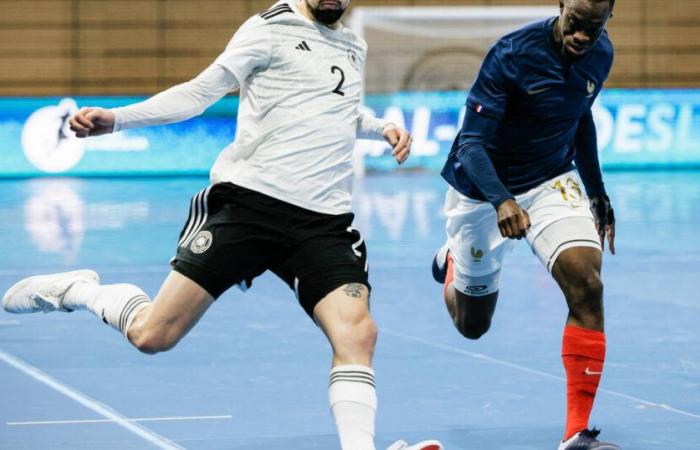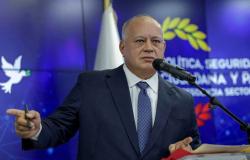It was 27 years ago, in 1997. The French Football Federation (FFF) launched its national men’s futsal team. Ten years later, a domestic championship was created. In 2018, for the first time in their history, the Blues qualified for the European Championship, their only participation to date. Three years later, coach Pierre Jacky, in office for seventeen years, left his post. The start of a new cycle embodied by his successor Raphaël Reynaud, who led the Tricolores to their first qualification for a World Cup, which will be played in Uzbekistan from September 14 to October 6, 2024, with a first match on Monday, September 16 against Guatemala. Undefeated, they flew through the qualifying stages with a record of eight wins and two draws. An osmosis on the court confirmed on April 14 by a historic success – albeit in a friendly match – against Brazil, the reigning nation of the discipline.
Proven results explained by a change that began a few years ago. “The first season of the state of play allowed us to change the game project. The idea was to build a stable environment for the players,” remembers Raphaël Reynaud, who insists on fully exploiting the potential of his men. “Most of them were trained in city stadiums, the fives [du football à cinq contre cinq, qui se joue sur des terrains fermés, ndlr]. My players are not necessarily able to solve all the problems of the game. The goal is therefore to rely on our dribbling, our ability to inspire. Whether it is against Brazil or another opponent, we do the same thing.”
“The gap between the world of football and futsal is huge”
The FFF ensures that this game plan is common to each futsal selection, senior and youth, men’s and women’s (whose selection was only created in 2023). “It is essential to rely on the same sporting identity to exist on an international scale. It was not a question of copying the Spanish or others, but of building our own futsal,” explains Raphaël Reynaud. The impact of which is felt well beyond the tactical aspect. “He transformed the players. With Pierre Jacky, the work was well done, but there was a blockage, a glass ceiling,” observes Philippe Lafrique, member of the FFF executive committee, and responsible for the development of the discipline. “In the locker room now, we no longer hear players complaining about the level of the gap because they are not professional [le championnat français reste amateur]. Mentalities have evolved.”
While Raphaël Reynaud can boast of being one of the only tacticians to have beaten the Seleçao, he is nonetheless clear-sighted about the work done previously. Let’s go back six years. Initiated by his predecessor Pierre Jacky and the FFF, a first development plan shook up French men’s futsal in 2018. “Noël Le Graët considered that it was not normal that the gap between the world of football and futsal was so huge,” remembers Philippe Lafrique. From that moment on, the FFF structured the D1 teams, with the appearance of “club licenses”, which allowed sports associations to receive an allocation of 20,000 euros per year. On condition that they create and develop youth sections, train security officers, educators, referees. The period coincided with the very first qualification of the Blues for the Euro.
Philippe Lafrique, then the custodian of the system, is riding the wave of momentum: “Qualifying was unexpected so early. It allowed us to have some visibility and to start this development more quickly.” D1 is becoming more competitive and is recruiting stars, like the Portuguese Ricardinho. “The French team owes its evolution to that of its championship. It continues to improve, evolve, and structure itself. Our clubs are progressing year after year,” notes Raphaël Reynaud.
“Faster than expected”
Once Philippe Diallo is at the head of the FFF, at the beginning of 2023, the second stage of the process is launched. In the president’s plans, futsal is set as a priority. “We had to keep moving forward. Philippe Diallo decided that futsal was a strong focus of the federation’s development plan, as much as women’s football.» The elite clubs now benefit from aid of between 80,000 and 120,000 euros. Internally, there is even consideration of establishing a professional license from the second division. “In Europe, apart from Spain with its professional league and its television rights, France is the country which supports its clubs the most financially,” assures Philippe Lafrique.
And to make the parallel: “Portugal, who are European and world champions, are five times less. The D1 clubs are vital for us. It is one of the best championships in Europe. The French team benefits from this, because some players are finally used to high-intensity matches.” Qualifying for the World Cup in Uzbekistan is a bonus, which will serve as both a test and an aperitif before the real objective, in two years. “We were thinking about Euro 2026, not the 2024 World Cup, says Philippe Lafrique. France has moved a little faster than expected. Now we will have to sustain these results to achieve our goal.”
Futsal is now the number 1 sport at the UNSS (National Union of Secondary School Sports). This makes it the most practiced discipline at school. In clubs, the number of members has increased from 25,000 to 45,000. The craze is taking off and it is now possible for any young person to try their luck at the Pôle France futsal in Lyon. Inspired by the Clairefontaine model, the structure was inaugurated in 2018 to compensate for the lack of training centers in France. “It allows us to take charge of the training of all young people. The results follow. Now, the under-19s qualify for the final phase of the European championships every time,” Philippe Lafrique rejoices.
French talents are now being exported, such as Mamadou Touré (FC Barcelona) and Amin Benslama (El Ejido). “Our credo is that our differences add up. These international experiences are positive for the group and mean that our results are currently convincing,” Raphael Reynaud draws up. And concludes: “The training provides talented young players to the French team. These are the results of the structuring of clubs and futsal schools. None of this existed ten years ago. It is a painstaking work that has allowed France to become a selection that counts.”






